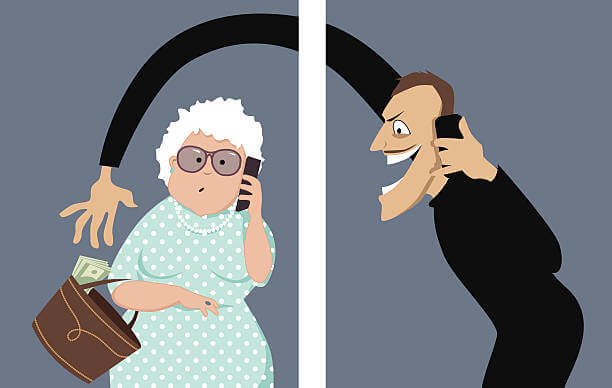Here’s What To Do If Your Elderly Parent Is Being Scammed

Credit: id-work
Seniors like our parents and grandparents aren’t tech-savvy, which already makes them vulnerable to being scammed.
Plus, they tend to have more money in the bank because they’re retired or close to and have a fixed income.
Put these variables together, and it’s no wonder they’re the likeliest demographic to be fraud victims after children.
For example, American seniors aged 60 and above lost over $1.6 billion to fraudsters in 2021 alone. And studies show this doesn’t tell the whole story.
So, it’s OUR RESPONSIBILITY to protect them from scammers, who, by the way, are getting on my nerves!
My uncle’s $200 was part of the losses in 2021. Yes, it’s not exactly an insane amount, but it made me realize how easily fraudsters use everyday items like gift cards to scam the elderly.
If you’re a caregiver or have seniors around you, it’s important to help them out not only from accidents at home. Or they could be scammed for a lot of money.
In the following paragraphs, we’ll discuss common elderly fraud to watch out for and how to protect our seniors from getting scammed.
What Is Elder Fraud?

Credit: Aleutie
Elder fraud happens when a fraudster targets seniors like your parents, grandparents, or uncles.
In such cases, there will be attempts to trick them into providing their sensitive details.
Fraudsters may also use fake promises of financial benefits, goods, or services to deceive your parents.
For example, seniors may be tricked into believing they’re investing in a fund with a high ROI. Of course, that doesn’t exist.
If you think the scammer is someone on the other side of the world, then you’re mistaken. Although perpetrators could be complete strangers, they could also be someone known to the elderly.
They could be family members, friends, colleagues, or neighbors.
Elder fraud can be devastating for victims. Many seniors report losing huge amounts of money, possibly their entire retirement savings.
This could result in a relatively new term called “Wealth Shock.” It means a person’s chances of death within a year significantly increase when they suddenly lose 75% of their net worth.
If you don’t want that to be your parents or loved ones, then stick around.
Why Are Seniors Such a Huge Target of Scams?
It’s surprising how older adults are targeted by scams. Every year, one in ten adults falls victim to fraud in the US.
Why is the rate SO HIGH?
There are a few reasons why our seniors are being targeted.
For one, they’re usually retired, close to retirement, and have a steady income – we mentioned this earlier.
This means they have a great credit history and more savings.
Scammers want money, so it’s only natural that they target someone with money. They know someone just starting in life and finding their way won’t have much to give.
Young adults have student loans to pay or even mortgages.
A study in 2020 showed that people over 55 hold about 72% of the nation’s wealth.
You’ll also agree that the elderly don’t spend as much as we do. My granddad doesn’t need a new house or anything like that. His money is sitting in the bank for him to enjoy in retirement.
But there are many more reasons why seniors are more likely to be scammed. These are:
1. Older Adults Have Similar Problems
Scammers find it easier to phish information from people when they know their problems.
Unfortunately, most of our parents share similar concerns.
For example, they may worry about medication costs, insurance coverage, financial security when retirement funds run out, providing for their loved ones, etc.
This makes it easier for them to be targeted.
A potential scammer can easily craft phishing emails on a specific number of topics that many of the recipients will find interesting.
2. Isolation
Many of our parents, especially grandparents, live alone.
If your parents or grandparents are mostly isolated, a phone call, instant message, or email from someone might excite them. Even if it’s a complete stranger.
Interestingly, several elder fraud cases wouldn’t have happened if the victim had spoken to a friend, caregiver, or family member about what was happening.
For instance, my uncle, who was scammed, is 72. He’s divorced and lives alone. We only heard about the scam AFTER he had sent the gift card.
But the whole scam had been running for weeks without him mentioning anything to anyone.
This happens to many other seniors.
They are isolated, meaning there’s no one around to run things by.
I understand that we have busy schedules, and there’s a lot on our plates, like work and family commitments. But it’s absolutely critical for you to stay in touch with seniors and speak to them about potential fraudulent activities.
3. Most Adults Are Too Trusting
What can I say?
Besides kids, seniors are the next demographic that would believe almost anything.
Most people above 50 have memories of a world before the internet came along. They grew up in a period where a person’s word is their bond.
Deals weren’t made through contracts but through handshakes.
But times have changed. Scammers have caught on to the elderly’s trusting nature, and they take advantage of it.
4. Seniors Are New to Technology
Also, they’ve likely spent most of their lives without sending and receiving emails.
Unfortunately, this means they can be a little confused about how trustworthy emails are.
It’s our responsibility to let them know the gravity of their actions online.
5. Poor Decision-Making
As we age, it’s common to notice some degree of mental decline.
Many seniors may have mental conditions that make it difficult to make sound judgments.
That could lead to poor decisions, especially when it comes to scams.
6. Concern About Independence
Lastly, seniors are more likely to be scammed because they’re worried about what we may think.
What do I mean?
We lose some of our abilities as we get older. We struggle with balance and can’t do what we used to do. This is besides the mental decline we mentioned earlier.
As a result, many elderly people worry about losing their independence. Dementia is a concern for these seniors. They fear their loved ones will believe they can no longer live alone.
That’s why a senior is less likely to report a scam after falling victim.
He may feel ashamed.
Or worried that his loved ones will scream at him for being dumb.
He may also be afraid of judgment. Maybe they will put him in a home because he fell for such a scam.
Due to these concerns, seniors will not report the scam. Since scammers know this, they will target the elderly.
Understanding why seniors are more likely to be scammed will help you know how to protect them.
Ensure you speak to your elderly parents often about scams, so they’re not isolated. Ask them about their day and if anything unusual happened recently,
Teach them about new technologies and how times have changed.
Talk to them about identity theft and why they shouldn’t give out personal information. Remind them why they shouldn’t be trusting.
And if they’ve been victims, it’s important not to “punish” them. Reassure your parents and grandparents that you won’t judge them if they are scam victims.
11 Common Senior Scams
- Medical
- Fake Investment Schemes
- False Charity
- Phishing Email
- Grandparent Scam
- Insurance Coverage Scam
- Romance Scams
- Government Impersonation
- Sweepstakes and Lottery Scams
- Identity Theft
- Tech Support Scam

Credit: Patcharapon Pachasirisakun
In most cases, it falls on us to be vigilant against different types of elder scams.
Sadly, we may also need to look out for other “loved ones” among us who may want to enrich themselves at the expense of our parents and grandparents.
One of the best ways to protect seniors from being scammed is to familiarize ourselves with the most common schemes scammers use to steal personal information or money.
Below are some of these types of fraud targeting seniors:
1. Medical
Seniors may feel overwhelmed by Medicaid, Medicare, the Affordable Care Act, and the recurring complexity of the healthcare system.
This makes them vulnerable to criminals.
Scammers may impersonate Medicare representatives to entice seniors into disclosing personal information like Social Security numbers.
Or they may offer seniors phony or unnecessary services at fake clinics, then use the personal data they have collected to bill Medicare and make off with the money.
For example, many seniors were scammed during COVID-19. Scammers preyed on the uncertainty around the pandemic and the confusion surrounding vaccination.
They promised to schedule vaccine appointments and mail test results in exchange for banking information or credit card numbers.
✎ Related: How Can You Keep Medical Billing Scams Away? ➔
2. Fake Investment Schemes
In 2021, people aged 60 and above lost over $239 million to investment scams!
I’ll tell you two reasons why criminals like to use fake investment schemes.
For one, many seniors could use more money because they often live on fixed, insufficient incomes.
On the other hand, if your parents are lucky, they’ll have sizable cash reserves. In fact, seniors have six times more savings than younger people on average.
Plus, they have access to significant amounts of money due to the equity in their homes.
Fraudsters will aim to deceive seniors with the promise of a huge return on investment down the road.
I’ll let you on a secret.
Most scammers will focus on short-term investments. Because, of course, that’s what seniors will be looking for.
One thing I keep in mind is this; if it’s too good to be true, it most likely is.
3. False Charity
Fraudsters may pose as representatives from a real charity or create fictitious charity organizations.
They can make calls, text, or send emails. In some cases, they may even visit seniors in person!
False charity schemes commonly happen after a significant event, like a health crisis, global socio-political campaigns, or a natural disaster.
For example, during the California storms, I received emails in late December 2022.
Luckily, I caught on and didn’t fall. But you can’t say the same about your parents and grandparents, who may genuinely want to help.
It’s disgusting how people use such events to scam. Fraudsters prey on the vulnerability of people during these times because we are more likely to be charitable.
Some fake charities can be impossible to identify for seniors or anyone. The scammer will go as far as creating an official-looking website to make the scam look real.
Thankfully, you can check online to confirm the legitimacy of a charity if you live in certain countries.
Depending on your country, the resources below might help:
You can also use sites like Charity Watch or Charity Navigator to research a charity’s authenticity. Or if the person that reached out to you is from the organization.
4. Phishing Email
In this case, your parents may receive an email asking them to “update” or “verify” their personal information.
It might seem legitimate because scammers actually research victims through social media.
The emails often contain phishing links that should not be clicked.
By gathering information from different sources, fraudsters might trick seniors into believing their contact or a legitimate company they patronize is messaging them.
✎ Related: What Is Phishing? – Definition, Types of Attacks & More ➔
5. Grandparent Scam
What if I told you that your grandparents’ sweetness could be used to scam them?
Crazy, right?
In this scam, a fraudster calls a senior, claiming to be their grandchild. For example, they may start the call with “Guess who?” And the unsuspecting grandma mentions a name.
The caller asks for money to be sent immediately so they can get through some sort of emergency, such as overdue rent, car repair bills, etc. They may ask the grandparents not to tell anyone as they could get into more trouble.
In 2019, an elderly woman in Ohio was scammed of $20,000 after a con artist pretended to be law enforcement.
The fraudster told her that her grandson had been arrested and needed bond money to be released.
She sent the money before looking for help from the local police.
It was too late.
6. Insurance Coverage Scam
Seniors can be scammed through insurance coverage schemes.
Con artists may offer discounts on various insurance policies, such as auto, home, and life. The latter is emotional blackmail to make the elderly consider those they may leave behind.
Sometimes an insurance agent will have a valid license but still try to defraud elderly people. It’s important to be vigilant against these scams.
7. Romance Scams
Romance scams often target women 50 and above, but men can be victims too.
Scammers will usually target seniors who have lost their spouses and are looking for companionship.
Did I mention my uncle thought he was sending $200 gift cards to a new lover in Florida?
You should ensure your grandparents or parents don’t fall for such schemes.
✎ Related: Signs of A Military Romance Scam ➔
8. Government Impersonation
When your parents start receiving calls or emails from supposed government officials, you should beware.
Scammers may call unsuspecting seniors pretending to be officials from the Internal Revenue Service (IRS) or the Social Security Administration.
They might claim the victim owes taxes and threaten to arrest or deport them if they don’t pay immediately.
If the victim doesn’t provide personal identifying information, they might threaten to stop providing Social Security or Medicare benefits.
You’re thinking, “The phone number should give it away.”
Well, scammers can “spoof” a public agency’s real phone number using specialized tools. They might even call from the same area code. For example, 202 for Washington, DC.
Don’t fall for it.
9. Sweepstakes and Lottery Scams
Look, sweepstakes and lottery scams target everyone.
It doesn’t matter if you’re old or young. But admittedly, seniors are more likely to be scammed.
Here’s how it happens:
A supposed lottery organization contacts the victim, telling them they’ve won an unbelievably huge amount of money. But they must pay a smaller sum of money before they can claim the prize.
The scammer will probably say the money is due to “international transfer fees” or something absurd.
If you’ve not played a lottery, you shouldn’t expect to win.
Also, legitimate lotteries are extremely regulated to prevent fraud. It’s almost impossible for a legitimate lottery company to contact the winner through email.
10. Identity Theft
Identity theft usually happens after the scammer uses any of the above means to obtain personally identifiable information.
Fraudsters can steal your mom’s identity to defraud an organization of money or other items.
According to the FTC, 19% of identity theft incidents affect seniors.
If your parents or grandparents have sizable assets, excellent credit scores, or high savings, they may be a target.
You can take advantage of many identity theft prevention services for extra precaution.
11. Tech Support Scam
Someone once told a joke that they charged their grandmother $20 to perform a “technical update.” Apparently, her phone’s display brightness dimmed, and all they did was increase the brightness.
It was only a joke. But it shows how easily scammers can use this scheme.
Fraudsters may claim to be from a legitimate company demanding payment for tech support services or to remove a virus. They’ll threaten that the victim’s device will stop working.
Of course, there’s no such thing. But your grandparents want to keep in touch with you, so they may fall victim.
There are many other examples, such as robocalls.
The important thing is to ensure the seniors around you are aware and follow the tips I will mention next.
✎ Related: What To Do If You’re Uncertain It’s a Geek Squad Scam? ➔
How To Protect Elderly From Scams – 10 Tips

Credit: id-work
Besides familiarizing yourself with the common types of scams, it’s also important to recognize warning signs and know what to do.
I tell people to always trust their gut in these cases. It’s fine to be skeptical and investigate things before acting.
Here are a few things you can do to protect seniors from getting scammed:
1. Be Present in Your Parents’ Lives
Isolation is one of the key reasons why many seniors are scammed.
Make sure your parents and grandparents have someone to talk to at all times. Ask them about their day and if anything unusual has happened lately.
Did they meet someone new?
Ask about this person and how they met.
Being connected to your loved ones makes it difficult for scammers to act.
2. Remind Seniors Never to Share Personal Details
I tell my mom it’s okay to share her favorite recipe on Facebook. My dad can upload our last hike together or discuss the game of football online.
But that’s about it.
They should never upload their personal details, such as bank account numbers, SSNs, or any other sensitive information.
Tell them why they shouldn’t answer random questions about their first car, their first child, their birth year, or their pet’s name. These may be attempts to guess their password or security questions.
3. Help Your Loved Ones Create Strong Passwords
Educate your parents why Mark1965 or 12345 aren’t safe passcodes.
Help them create strong passwords that combine numbers, letters, and special characters. Make sure these passcodes are at least 15 characters long.
Remind them why they shouldn’t use one password for multiple accounts.
My parents have no idea what antivirus is, and there’s no point in explaining. I just make it a point to install some of the best and update regularly.
Some antivirus examples are McAfee Antivirus, Kaspersky, and Norton.
4. Be Careful With Online Shopping
If your mom loves online shopping like mine, make sure you limit purchases to reliable retailers. Show her the importance of “https” or the “padlock” in the URL to confirm if a site is secure.
5. Avoid Suspicious Links
As a rule of thumb, I tell my parents never to click on any links – not even the ones I send to them.
They must not click links in emails, social media messages, or texts. They should also not take calls from suspicious or fake caller IDs.
6. Monitor Monthly Banking Statements
Missing banking statements can indicate identity theft.
When seniors say they haven’t received their monthly bank or credit card statements, they could have been scammed.
If they don’t already receive monthly banking statements, ensure they start doing so.
In addition, statements should be shredded and not just thrown into the trash. Dumpster diving is still a thing.
You should also help them check their credit reports annually for signs of identity theft or unauthorized accounts.
7. Protect Your Parents’ Social Media Account
First off, make sure your parents only accept friend requests from people they know.
Limit who can see their profiles by updating the privacy and security settings.
Trust me; they can still have fun on social media without the whole world seeing their profile.
Tell them a stranger might fall in love with them online or compliment them and want to get to know them.
DELETE the messages immediately, no matter how flattering the message may be.
In addition, protect your parents’ social media accounts with multi-factor authentication.
They may need to enter a code sent to their phone or email whenever they want to log in to their account afresh.
This extra security measure can protect them against scammers even if they have their username or password.
8. Avoid Odd Payment Types
Fraudsters often ask victims to send money via cryptocurrency, wire transfer, payment app, gift card, or money order.
Make sure your parents and grandparents are suspicious of any excuse for alternative payment methods.
9. Ask Your Parents to Name You as a Trusted Contact
Being named as a Trusted Contact Person won’t make you access their account or make financial decisions.
But it allows you to speak with your parent’s financial advisors if you believe there may be concerns with their financial well-being.
Encourage your parents to make you a trusted contact.
10. Warn Other Family and Friends
If one of your parents or grandparents has recently experienced a scam attempt, you should warn others.
Your other loved ones might be targets because you never know where and how the scammer got their information.
As I mentioned above, talk about the experience and what to do to prevent the fraudulent attempt.
What to Do If an Elder Has Been Scammed?
Has one of the elderly people you know been scammed? Here are a few things to do:
1. Don’t Panic
Don’t freak out.
Or you may end up making things worse.
If there’s anyone that needs a cool head, it’s you.
2. Document What Has Happened
Record everything that happened. Ask the senior to tell you everything they remember about the incident.
This includes phone call logs, screenshots of text messages, and all emails.
3. Report the Scam
Report the scam to the FTC immediately.
If they’re your parents, contact their bank and credit card providers immediately. In most cases, their fraud teams will be able to help.
You can also contact the National Elder Fraud Hotline in the US to track how frequently the scam is happening. Please do this only after reporting to the FTC.
4. File a Report
Ensure you file a report with your local police.
Most creditors will request a police report. So, get a copy of this and the case number. You can still report to your local Sheriff’s office even if you are not sure of the specifics yet.
5. Change Passwords
This goes without saying, but you should change all passwords to new and stronger ones.
Change passwords of credit cards, bank, social media accounts, investment profiles, or any other site with their personal accounts.
Set different passwords for each site and enable 2-factor Authentication (2FA).
Conclusion
Being vigilant and security-conscious will help you spot most scams. But because they can be confused, trusting, or isolated, many seniors end up being scammed.
Don’t forget; that scams usually involve strangers, but some might be from family members, caregivers, or neighbors.
It’s essential to maintain social contact with your parents and grandparents. Educate them about how times have changed.
Ensure your parents and grandparents check their financial statements regularly, use stronger passwords, be extra cautious online, and shred physical documents containing personal info.
